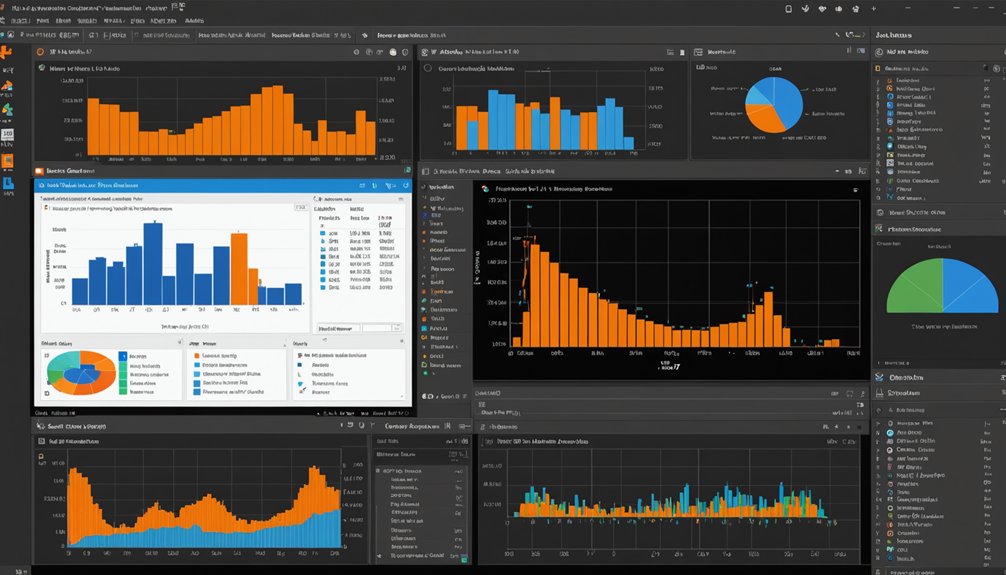Gemini is Google’s multimodal AI system that processes text, images, audio, and video. It comes in three variants: Ultra for complex tasks, Pro for everyday use, and Nano for smartphones. The tech can solve math problems, generate code, analyze data, and summarize content effectively. Originally powering Google’s Bard chatbot, Gemini’s expanding across Google services. And yeah, it’s basically their answer to ChatGPT. The future holds even deeper integration across Google’s ecosystem.

In the digital landscape of AI innovation, Gemini stands out as Google’s answer to the generative AI revolution. This suite of AI models was built to be natively multimodal from the ground up – not some retrofitted text model with bolted-on features. It processes text, images, audio, and video simultaneously. No big deal, just completely changing how we interact with AI.
Gemini comes in three distinct flavors: Ultra, Pro, and Nano. Think of them as small, medium, and “holy cow that’s powerful” versions. Each one tailored for different computational demands. Ultra handles the heavy lifting while Nano works on your smartphone. Pretty clever naming convention, Google. The system leverages predictive analytics capabilities similar to those transforming modern supply chains.
Gemini’s trio of models scales from pocket-sized Nano to brain-melting Ultra. Because one size of AI definitely doesn’t fit all.
Currently powering Google’s chatbot (formerly called Bard – they really can’t stick with a name), Gemini is slowly creeping into other Google services. It’s the digital equivalent of manifest destiny, expanding across Google’s digital empire one product at a time. Its data analytics capabilities enable sophisticated customer behavior tracking and personalized experiences.
The technical capabilities? Impressive, actually. Gemini tackles complex math problems, generates code that doesn’t immediately crash, and analyzes data from tables and charts. It even summarizes web content without butchering the main points. A true renaissance AI.
For bloggers and content creators, Gemini streamlines research by aggregating data, validating facts, and synthesizing information. It identifies trends and performs semantic searches that actually understand what you’re asking for. Gemini can also expand initial ideas into multiple blog posts with related keywords and subtopics. Revolutionary stuff, or at least that’s what Google wants us to think.
Announced with much fanfare at Google I/O 2024, Gemini will eventually integrate with Project Astra and power AI overviews in search results. The rollout has been gradual – available on some Pixel devices and through Google’s services. Through its ability to automate repetitive tasks, Gemini could potentially increase worker productivity by up to 40 percent according to economic forecasts.
Behind the scenes, Gemini resulted from collaborative development across Google’s teams. The company positioned it as direct competition to OpenAI’s GPT models. The AI arms race continues, and Google just deployed its nuclear option. Let’s see if it lives up to the hype.
Frequently Asked Questions
How Does Gemini Compare to Chatgpt?
Gemini versus ChatGPT? They’re neck-and-neck competitors with distinct strengths.
Gemini excels in creative tasks, complex reasoning, and handling multimedia content. ChatGPT dominates text-based tasks, SEO, and customer support.
Price-wise, Gemini starts cheaper at $7.20 monthly compared to ChatGPT’s $20. Both charge $1.25 per million tokens.
Gemini integrates smoothly with Google’s ecosystem, while ChatGPT offers better API flexibility.
Pick your poison based on your needs.
Can I Use Gemini for Free?
Yes, Gemini is absolutely free for basic use. Users need a Google account—personal or Workspace.
The free version runs on Google’s 1.5 Flash Model. Not bad for zero dollars. Text prompts, image uploads, cloud storage access—all included.
Obviously, limitations exist. Monthly usage caps. Less detailed results than paid. Advanced features? Locked behind Gemini Advanced’s paywall.
But for casual users? The free version works just fine.
Does Gemini Have Access to Real-Time Information?
Gemini does have real-time information access. It pulls current events, timely data, and updates from authorities right into conversations.
News, health guidelines, government info—it’s all there. The system analyzes current trends in tech and pop culture too. Pretty impressive stuff.
Not everything’s perfectly up-to-the-minute though. It’s connected to Google’s vast network of services, which keeps things relatively fresh.
What Languages Does Gemini Support?
Gemini supports a wide array of languages. For text, it handles Arabic, Bengali, Bulgarian, Chinese (both simplified and traditional), and Croatian, among others.
Programming-wise, it’s fluent in Python, Java, C++, Go, and over 20 other coding languages.
Not just text, though. The system recognizes speech across 100+ languages and can translate audio inputs too.
Pretty extensive coverage, honestly.
Is My Data Private When Using Gemini?
Gemini collects user data—conversations, location, feedback. Period.
While Google claims 18-month retention, privacy isn’t guaranteed. Human reviewers sometimes analyze conversations (yikes).
Users can limit tracking and avoid sharing sensitive info, but even anonymous usage gets processed.
Google lets you adjust privacy settings, sure, but data still serves their machine learning goals.
Best bet? Don’t share anything you wouldn’t want reviewed by strangers.




